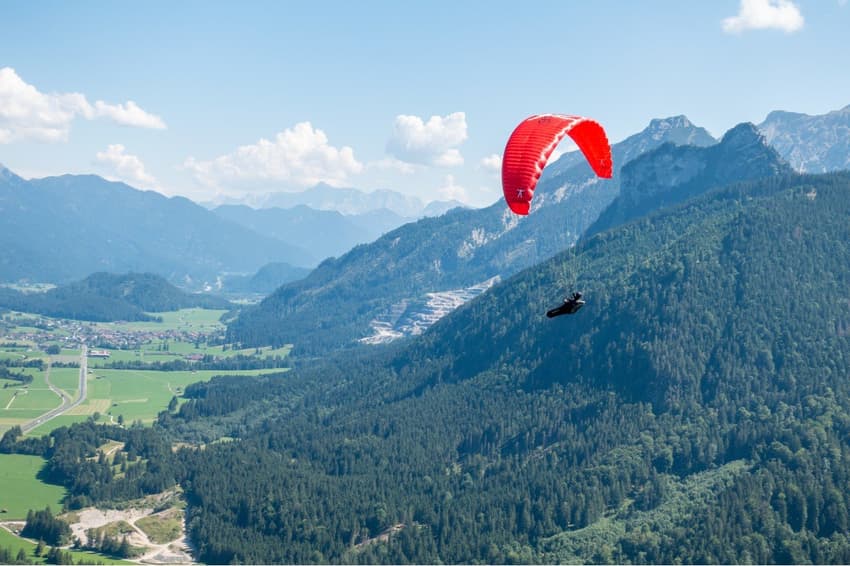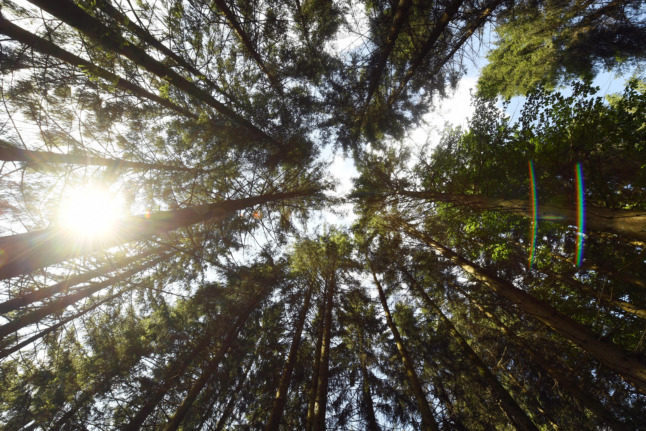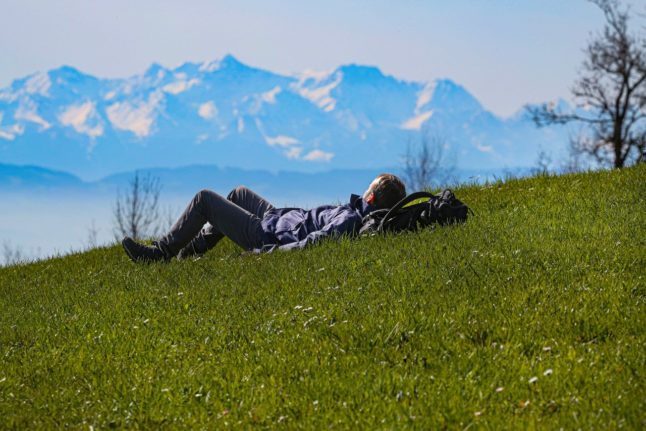Wild peeing to paragliding: 7 offences you can be fined for in Germany's great outdoors

From the towering Alps to lush green forests, Germany has an abundance of natural beauty to explore this summer. But explorers can get hit with sharp penalties for breaking these (sometimes not so obvious) rules.
Freedom and mountains: they simply go together, right? Just park your camper anywhere, go on a rocky biking tour during the day, and light a romantic campfire in the evening before settling down to bed.
That could be a fun and adventurous holiday - but it could also get expensive. That's because all of these activities involve high penalties, according to Germany’s Catalogue of Fines (Bußgeldkatalog).
Watch out for these seven things you can get fined for when hiking, biking, or just generally enjoying Germany’s abundant nature.
READ ALSO: Holiday like a local: Five of the best camping regions in Germany
The banned bouquet
A beautiful bouquet of wildflowers for grandma or an assortment of mountain edelweiss for your significant other: beautiful, yet not always allowed. In Germany, the so-called "hand bouquet rule" (Handstraußregel) applies. This means that anyone may take wild flowers, grasses, ferns, mosses, lichens, fruits, mushrooms, herbs and twigs in small quantities for personal use.
However, this only applies in public and freely accessible places and only to plants that are not specially protected by legal regulations.
If plants are taken from a flower bed in the city, this is considered theft, but is usually only considered minor. If you do the same in the forest, you can expect a fine of up to €20,000. In a nature reserve, a freshly picked bouquet of flowers can (theoretically) set you back up to €50,000.
Illegal camping in the mountains
For many people, camping equals freedom: you simply pitch your tent at a scenic spot, or quickly set up your van or motorhome in a hikers' car park in the mountains. Yet this romantic dream can quickly result in a fine in reality. While each of Germany’s 16 states has its own laws, in most cases it is not permitted to simply choose your overnight accommodation freely.
In addition, a distinction is usually made according to the type of camping: are you travelling with a tent, are you driving a huge off-road camper van or is it just a simple emergency shelter, like a bivouac?
According to Germany's catalogue of fines, “wild camping” with a tent in Bavaria can result in fines of €15 to €500. Anyone who simply parks somewhere with a camper van or caravan and is caught can expect fines of up to €25 to €2,500.

The soaring pine trees in the Schwarzwald National Park is a must-see for all nature lovers, Photo: picture alliance/dpa | Uli Deck
Unlawful kindling
A nice wood fire outside at night sounds romantic, but it can also be dangerous - not to mention expensive. In most cases, it is not forbidden in principle. However, there are - depending on the country - a variety of rules. In Bavaria and Austria, for example, you need the permission of the person who owns the land.
In most cases, only untreated wood or charcoal is allowed to be used. In certain areas or dry months, however, fires may be prohibited altogether. Those who do not comply or are caught must pay up to €2,500 in Germany.
Wild peeing
Struggling to find a toilet while desperate for the loo? If you decide to nip behind a nearby tree, you may be committing an administrative offence. In Germany, the fines are generally set by the municipality and being charged up to €5,000 is possible. However, you're more likely to get a slap on the wrist to the tune of €30 to €60.
Illegal cycling
Shortening a long hike with a mountain bike, or even taking a whole bike tour in the mountains, is not always a good idea.
There are no uniform regulations in Germany, but generally bikers are expected to stick to forest roads and suitable paths.
What constitutes a "suitable path" is interpreted differently depending on the state. In Baden-Württemberg, for example, a minimum width of two metres applies. Otherwise cyclist could be hit with a fine of €7,270.
READ ALSO: Here are 10 of Germany's best (and longest) cycling trails

A hiker relaxes at an alpine viewing point in Baden-Württemberg. Photo: picture alliance/dpa | Thomas Warnack
Think twice about paragliding
On some hikes, it would be so convenient to simply fly back down to the valley after the sweaty ascent and a good summit snack, instead of struggling down in your sweaty hiking boots and with aching knees.
But even if you know how to handle a paraglider, you can't just take off everywhere. In the region around Mont Blanc, for example, there is a summer flying ban: here, taking off is not allowed in July and August.
And even in national parks in German-speaking countries, there are often strict regulations or even bans on paraglider launches. There was particularly intense discussion about a wingsuit jump from the east of the Watzmann mountain in Berchtesgaden, Bavaria, back in October 2019. In the end, the paraglider was hit by a fine from the district office, which could have been as much as €2,500.
The forbidden waterfall at Königssee
It used to be an insider tip among locals. But through social networks like Instagram, the stunning Königsbach Waterfall has garnered worldwide attention.
However, the sudden fame also brought far-reaching consequences: in recent year, several hikers have drowned while bathing in its natural pool. Due to the numerous visitors, the surrounding topsoil and tree roots have also suffered greatly.
READ ALSO: How to stay safe while swimming outdoors in Germany this summer
At first, the national park tried to persuade the masses of visitors to voluntarily avoid the area with information and appeals. However, this had no effect. Therefore, in summer 2021, those responsible decided to impose a ban on entering an area of ten hectares around the waterfall.
Anyone who does not comply is committing an offence and can expect a fine in the three-digit range. In extreme cases, the fine can even go as high as €25,000. The ban on accessing the waterfall is initally in place for five years.
Comments
See Also
Freedom and mountains: they simply go together, right? Just park your camper anywhere, go on a rocky biking tour during the day, and light a romantic campfire in the evening before settling down to bed.
That could be a fun and adventurous holiday - but it could also get expensive. That's because all of these activities involve high penalties, according to Germany’s Catalogue of Fines (Bußgeldkatalog).
Watch out for these seven things you can get fined for when hiking, biking, or just generally enjoying Germany’s abundant nature.
READ ALSO: Holiday like a local: Five of the best camping regions in Germany
The banned bouquet
A beautiful bouquet of wildflowers for grandma or an assortment of mountain edelweiss for your significant other: beautiful, yet not always allowed. In Germany, the so-called "hand bouquet rule" (Handstraußregel) applies. This means that anyone may take wild flowers, grasses, ferns, mosses, lichens, fruits, mushrooms, herbs and twigs in small quantities for personal use.
However, this only applies in public and freely accessible places and only to plants that are not specially protected by legal regulations.
If plants are taken from a flower bed in the city, this is considered theft, but is usually only considered minor. If you do the same in the forest, you can expect a fine of up to €20,000. In a nature reserve, a freshly picked bouquet of flowers can (theoretically) set you back up to €50,000.
Illegal camping in the mountains
For many people, camping equals freedom: you simply pitch your tent at a scenic spot, or quickly set up your van or motorhome in a hikers' car park in the mountains. Yet this romantic dream can quickly result in a fine in reality. While each of Germany’s 16 states has its own laws, in most cases it is not permitted to simply choose your overnight accommodation freely.
In addition, a distinction is usually made according to the type of camping: are you travelling with a tent, are you driving a huge off-road camper van or is it just a simple emergency shelter, like a bivouac?
According to Germany's catalogue of fines, “wild camping” with a tent in Bavaria can result in fines of €15 to €500. Anyone who simply parks somewhere with a camper van or caravan and is caught can expect fines of up to €25 to €2,500.

Unlawful kindling
A nice wood fire outside at night sounds romantic, but it can also be dangerous - not to mention expensive. In most cases, it is not forbidden in principle. However, there are - depending on the country - a variety of rules. In Bavaria and Austria, for example, you need the permission of the person who owns the land.
In most cases, only untreated wood or charcoal is allowed to be used. In certain areas or dry months, however, fires may be prohibited altogether. Those who do not comply or are caught must pay up to €2,500 in Germany.
Wild peeing
Struggling to find a toilet while desperate for the loo? If you decide to nip behind a nearby tree, you may be committing an administrative offence. In Germany, the fines are generally set by the municipality and being charged up to €5,000 is possible. However, you're more likely to get a slap on the wrist to the tune of €30 to €60.
Illegal cycling
Shortening a long hike with a mountain bike, or even taking a whole bike tour in the mountains, is not always a good idea.
There are no uniform regulations in Germany, but generally bikers are expected to stick to forest roads and suitable paths.
What constitutes a "suitable path" is interpreted differently depending on the state. In Baden-Württemberg, for example, a minimum width of two metres applies. Otherwise cyclist could be hit with a fine of €7,270.
READ ALSO: Here are 10 of Germany's best (and longest) cycling trails

Think twice about paragliding
On some hikes, it would be so convenient to simply fly back down to the valley after the sweaty ascent and a good summit snack, instead of struggling down in your sweaty hiking boots and with aching knees.
But even if you know how to handle a paraglider, you can't just take off everywhere. In the region around Mont Blanc, for example, there is a summer flying ban: here, taking off is not allowed in July and August.
And even in national parks in German-speaking countries, there are often strict regulations or even bans on paraglider launches. There was particularly intense discussion about a wingsuit jump from the east of the Watzmann mountain in Berchtesgaden, Bavaria, back in October 2019. In the end, the paraglider was hit by a fine from the district office, which could have been as much as €2,500.
The forbidden waterfall at Königssee
It used to be an insider tip among locals. But through social networks like Instagram, the stunning Königsbach Waterfall has garnered worldwide attention.
However, the sudden fame also brought far-reaching consequences: in recent year, several hikers have drowned while bathing in its natural pool. Due to the numerous visitors, the surrounding topsoil and tree roots have also suffered greatly.
READ ALSO: How to stay safe while swimming outdoors in Germany this summer
At first, the national park tried to persuade the masses of visitors to voluntarily avoid the area with information and appeals. However, this had no effect. Therefore, in summer 2021, those responsible decided to impose a ban on entering an area of ten hectares around the waterfall.
Anyone who does not comply is committing an offence and can expect a fine in the three-digit range. In extreme cases, the fine can even go as high as €25,000. The ban on accessing the waterfall is initally in place for five years.
Join the conversation in our comments section below. Share your own views and experience and if you have a question or suggestion for our journalists then email us at [email protected].
Please keep comments civil, constructive and on topic – and make sure to read our terms of use before getting involved.
Please log in here to leave a comment.